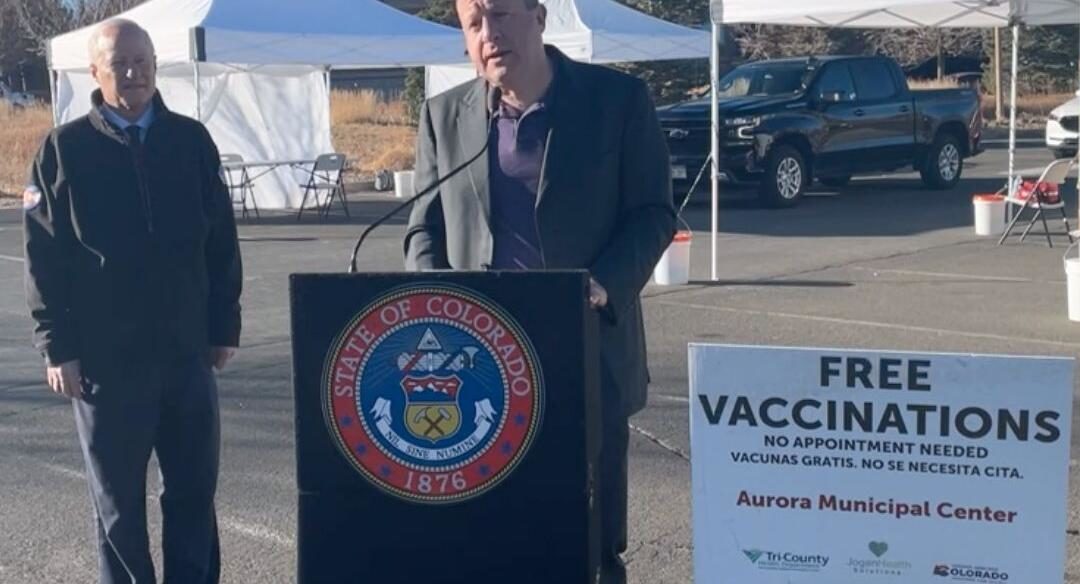Colorado officials have identified what they believe is the state’s first case of omicron community spread, and Gov. Jared Polis said Thursday morning that it was “only a matter of time” before the new strain “becomes the prevalent variant in Colorado.”
The state has five cases of the omicron variant as of Thursday morning, Polis said at a news conference outside of a vaccination site in Aurora. The state Department of Public Health and Environment has also now detected the variant in “multiple wastewater systems across the state,” state epidemiologist Rachel Herlihy said in a separate news conference Thursday. Those systems are in Boulder, Aurora and Commerce City, as well as in a system shared between Lakewood and Denver.
A spokesperson for the health department said in an email that a new omicron case identified in a Garfield County resident, who has no recent history of travel, is believed to be a result of community spread.
“We now face a new threat with the omicron variant,” the governor told reporters Thursday morning. “We have five cases of omicron confirmed, but it’s only a matter of time until it becomes the prevalent variant here in Colorado as it has in every other place it’s been.”
“We fully expect that we are going to continue to see increasing rates of the omicron variant here in Colorado,” Herlihy said, adding it was unclear how long that rise would take.
Two omicron cases were identified two weeks ago, in Arapahoe and Boulder counties. Jefferson County reported a case this week, Garfield County announced its case Wednesday, and the state health department spokesman said a second Arapahoe County resident, also with a recent history of travel, was also infected by the variant.
Both Arapahoe cases, as well as the Boulder and Jefferson cases, were identified in patients who’d recently returned from traveling to Africa, where the variant was first officially identified, though it was likely circulating in Europe before that.
Despite question marks remaining around what omicron will do, Colorado’s overall COVID-19 situation has improved markedly over the past month. Cases, the positivity rate and hospitalizations have all gone down significantly from the days before Thanksgiving. Hospital capacity remains stretched, albeit at a stable, consistent level.
Delta remains the dominant variant in Colorado. It first emerged in force here in June and, by the end of the summer, was responsible for the bulk of the state’s cases. For months now, it has accounted for virtually every infection in Colorado, and its rapid transmissibility has helped push hospitals to the brink of capacity and led to a spike in deaths.
But, as Polis alluded to, omicron is spreading rapidly in various parts of the world. Much remains unknown about omicron, but increasingly officials are warning that at the very least it appears more transmissible than the delta variant, which was already putting pressure on hospitals from the United States to the Netherlands. With so many questions outstanding, uncertainty reigned over how quickly and how severely to crack down on Christmas travel and end-of-year parties.
After the U.K. recorded its highest number of confirmed new COVID-19 infections since the pandemic began, France announced Thursday that it would tighten entry rules for those coming from Britain. Hours later, the country set another record, with 88,376 confirmed COVID-19 cases reported Thursday, almost 10,000 more than the day before.
Globally, more than 75 countries have reported confirmed cases of the new variant. In Britain, where omicron cases are doubling every two to three days, the variant is expected to soon replace delta as the dominant strain in the country — and the government has accelerated its booster program in response. Authorities in the 27-nation European Union say omicron will be the dominant variant in the bloc by mid-January.
In addition to hints that omicron is more contagious, early data suggest the variant may be milder but better at evading vaccines — making booster shots more crucial. Experts have urged caution in particular on drawing conclusions about how mild it is because hospitalizations lag behind infections and so many variables contribute to how sick people get.
The Associated Press contributed to this report.
This content was originally published here.

